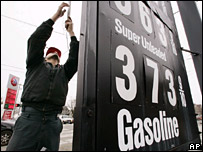Oil hits $120 a barrel milestone
 The price of a barrel of oil has risen above $120 for the first time, driven by concerns about the situations in Nigeria and northern Iraq.
The price of a barrel of oil has risen above $120 for the first time, driven by concerns about the situations in Nigeria and northern Iraq.US light sweet crude rose to a record of $120.36 a barrel in morning trading in New York before falling back to a record close of $119.97 - up $3.65.
Another factor pushing up the oil price has been the US dollar’s weakness as investors opt to back commodities.
Since the beginning of the year, oil has hit a string of new highs.
This has led to gas and petrol prices reaching unprecedented levels, in many parts of the world.
‘Lingering hotspot’
In Northern Iraq, Turkish forces have renewed cross-border raids against Kurdish insurgents.
Meanwhile in Nigeria, rebels have attacked oil wells and pipelines which feed an export terminal.
“Nigeria is the lingering hotspot the markets will be focusing on,” said MF Global analyst Ed Meir.
He added that while some production in the oil-rich African nation, there were “reports of fresh violence, as another pipeline explosion has shut in more oil production”.
The relationship between currency markets and commodity prices is a relatively new phenomenon, Damian Cox from John Hall Associates told the BBC last week.
“Since about August, commodities appear to have been responding to movements in the currency markets,” he said.
“As the dollar has weakened, some people have moved into commodities.”
In the past, a weakening US dollar would have been seen as a sign of weakness in the US economy, which would have meant that demand for oil was likely to fall and so the oil price would fall.
But now, some traders see commodities such as oil as a hedge against declining currencies.
So, if they were worried about the dollar falling in value, they might sell dollars and buy oil, for example.
You can return to the main Market News page, or press the Back button on your browser.

